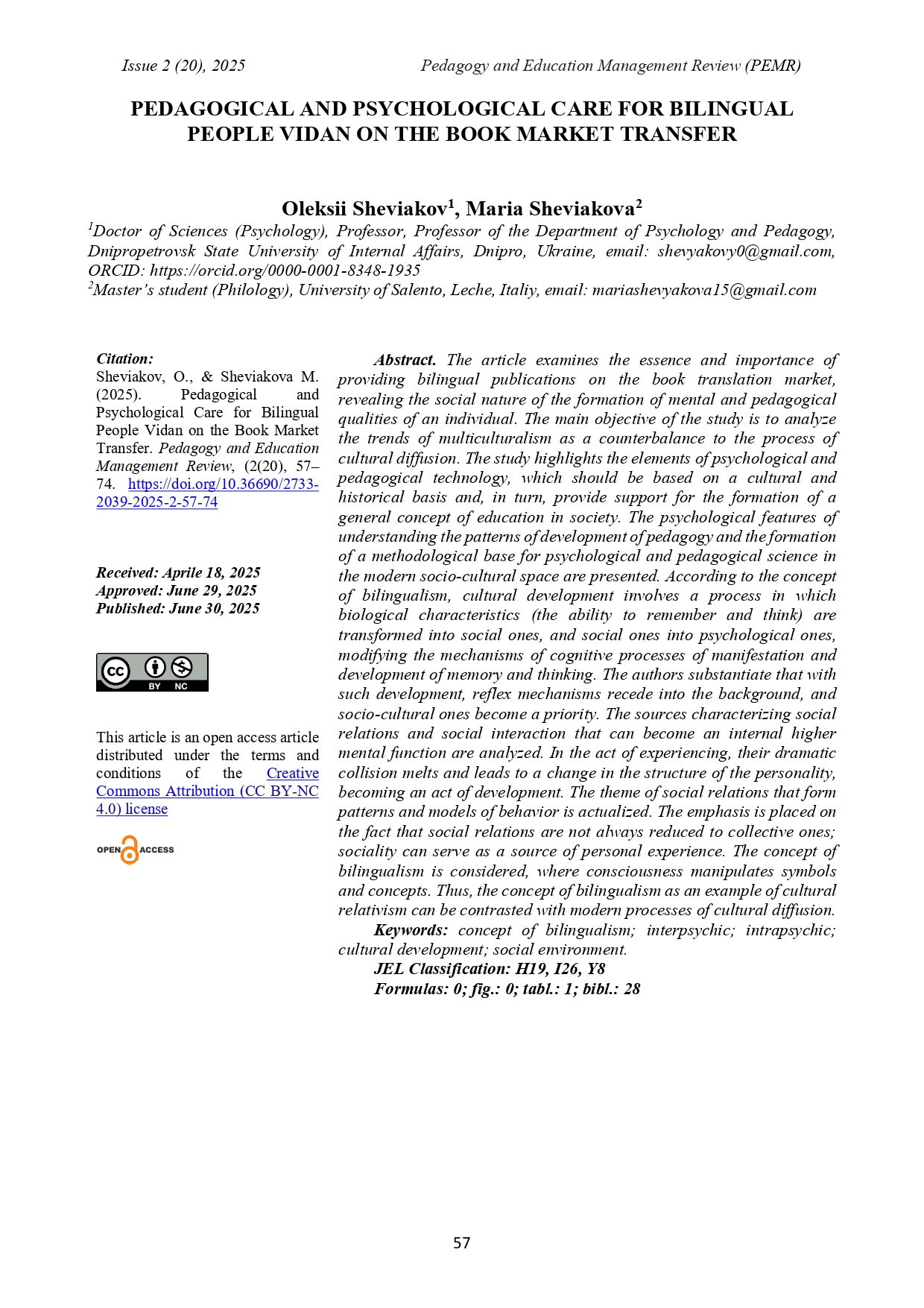PEDAGOGICAL AND PSYCHOLOGICAL CARE FOR BILINGUAL PEOPLE VIDAN ON THE BOOK MARKET TRANSFER
DOI:
https://doi.org/10.36690/2733-2039-2025-2-57-74Keywords:
concept of bilingualism, interpsychic, intrapsychic, cultural development, social environmentAbstract
The article examines the essence and importance of providing bilingual publications on the book translation market, revealing the social nature of the formation of mental and pedagogical qualities of an individual. The main objective of the study is to analyze the trends of multiculturalism as a counterbalance to the process of cultural diffusion. The study highlights the elements of psychological and pedagogical technology, which should be based on a cultural and historical basis and, in turn, provide support for the formation of a general concept of education in society. The psychological features of understanding the patterns of development of pedagogy and the formation of a methodological base for psychological and pedagogical science in the modern socio-cultural space are presented. According to the concept of bilingualism, cultural development involves a process in which biological characteristics (the ability to remember and think) are transformed into social ones, and social ones into psychological ones, modifying the mechanisms of cognitive processes of manifestation and development of memory and thinking. The authors substantiate that with such development, reflex mechanisms recede into the background, and socio-cultural ones become a priority. The sources characterizing social relations and social interaction that can become an internal higher mental function are analyzed. In the act of experiencing, their dramatic collision melts and leads to a change in the structure of the personality, becoming an act of development. The theme of social relations that form patterns and models of behavior is actualized. The emphasis is placed on the fact that social relations are not always reduced to collective ones; sociality can serve as a source of personal experience. The concept of bilingualism is considered, where consciousness manipulates symbols and concepts. Thus, the concept of bilingualism as an example of cultural relativism can be contrasted with modern processes of cultural diffusion.
Downloads
References
Akhmanova, O. S. (2004). Dictionary of linguistic terms (2nd ed.). Moscow: Editorial URSS.
Alekseev, M. P., Zakharov, V. N., & Tomashevskyi, B. B. (Comps.). (2021). English poetry in translations (XIV–XIX centuries): Collection (684 p.).
Avrorin, V. A. (2020). Bilingualism and school. In Problems of bilingualism and multilingualism (pp. 49–62).
Berg, N. I. (1854). Songs of different nations (592 p.).
Bertagaev, T. (2022). Bilingualism and varieties in the system of use. Problemy dvuyazychiya i mnogoyazychiya, 82–88.
Brodsky, I. (1999). Compositions. Saint Petersburg: Azbuka-klassika.
Busel, V. T. (Ed.). (2005). A large explanatory dictionary of the modern Ukrainian language (with additional supplement). Kyiv–Irpin: VTF "Perun".
Doblhofer, E. (2023). Signs and miracles (388 p.).
DSTU 3017:2015. (2015). Information and documentation. Publications. Main types. Terms and definitions of concepts(replaces DSTU 3017-95). Kyiv: Derzhspozhyvstandart Ukrainy.
Gorky, M. (1955). Collected works (Vol. 30). Moscow.
Herd, A. S. (2005). Introduction to ethnolinguistics: A course of lectures and textbook (2nd ed., 458 p.).
Ivanova, L. P. (2018). Cognitive aspects of bilingualism. In Abstracts of the reports of the International Forum “Dialogue of Languages and Cultures of the CIS in the 21st Century” (Bishkek, June 9–13, 2018, pp. 34).
Kochergan, M. P. (2010). General linguistics (464 p.). Kyiv: Akademiia.
Kosmeda, T. (2013). The linguistic personality of Taras Shevchenko as a mirror of the development of the Ukrainian language in the mid-19th century: Problematic aspects. Volyn Philological: Text and Context, (15), 139–148.
Kraynikova, T. S. (2011). Publishing culture: Definition, structure and factors. Scientific Notes of the Institute of Journalism, (43), 134–138.
Martyne, A. (2023). Fundamentals of general linguistics. New in Linguistics: Progress, (3), 366–564.
Tymoshyk, M. (2012). Artistic editing: Theoretical and practical aspects (38 p.). Kyiv: Nasha kultura i nauka.
Ukrainian language. Encyclopedia (2010). Kyiv: Ukrainian Encyclopedia Publishing House.
Vereshchagin, E. M. (2019). Psychological and methodological characteristics of bilingualism (bilingualism).
Verlaine, P. (2011). Love. Moscow: O.G.I.
Vishnevskaya, H. M. (2011). Literary and artistic bilingualism: Linguistic interpretation (223 p.). Ivano-Frankivsk: IvSU.
Weinreich, U. (1999). Monolingual and multilingual. In Foreign Linguistics, III, 134 p.
Yanovych, K. Ya. (2013). Bilingual publications in the cultural space. Bulletin of MGUKI, (3[53]), 26–29.
Yartseva, N. (Ed.). (1990). Linguistic encyclopedic dictionary (683 p.). Moscow: Soviet Encyclopedia.
Zalevskaia, A. A., & Medvedeva, I. L. (2022). Psycholinguistic problems of bilingual education: Study guide (194 p.). Tula: Tula State University.
Zharkov, I. N. (2022). Technology of editorial and publishing: Lecture notes (91 p.). Moscow: MGUP.
Zhluktenko, Yu. O. (2016). Language contacts. Kyiv: Kyiv University Publishing House.
Zhukovsky, V. A. (2023). Aesthetics and criticism. (F. Z. Kanunova, O. B. Lebedeva & A. S. Yanushkevich, Eds.). Moscow: Iskusstvo.







